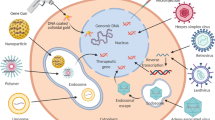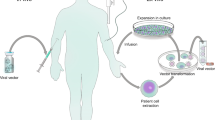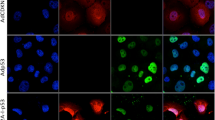Abstract
At the Eleventh International Conference on Gene Therapy of Cancer (December 12–14, 2002, San Diego, CA) progress on using gene transfer technology to treat cancer was presented. Although there is as yet no cancer gene therapy being marketed, considerable progress has been made in defining likely strategies and likely targets for gene therapy of cancer. These strategies, including viral and non-viral delivery systems, and potential targets in cancer cells linked to our developing knowledge of cancer cell biology, are reviewed in this paper. Use of gene therapy to sensitize tumors to radiation and chemotherapy is one promising area of investigation. Some of the ancillary benefits of research on cancer gene therapy, including the development of public-private partnerships, recruitment of laboratory scientists into clinical research, and credentialing of potential cancer cell targets for therapies other than gene therapy, are noted.
This is a preview of subscription content, access via your institution
Access options
Subscribe to this journal
Receive 12 print issues and online access
$259.00 per year
only $21.58 per issue
Buy this article
- Purchase on Springer Link
- Instant access to full article PDF
Prices may be subject to local taxes which are calculated during checkout




Similar content being viewed by others
References
Aebersold P, Kasid A, Rosenberg SA . Selection of gene-marked tumor infiltrating lymphocytes from post-treatment biopsies: a case study. Hum Gene Ther. 1990;1:373–384.
Cai Q, Rubin JT, Lotze MT . Genetically marking human cells — results of the first clinical gene transfer studies. Cancer Gene Ther. 1995;2:125–136.
Hanahan D, Weinberg RA . The hallmarks of cancer. Cell. 2000;100:57–70.
Yen N, Ioannides CG, Xu K, et al. Cellular and humoral immune responses to adenovirus and p53 protein antigens in patients following intratumoral injection of anadenovirus vector expressing wild-type p53 (Ad-p53). Cancer Gene Ther. 2000;7:530–536.
Horio Y, Hasegawa Y, Sekido Y, Takahasi M, Roth JA, Shimokata K . Synergistic effects of adenovirus expressing wild-type p53 on chemosensitivity of non small cell lung cancer cells. Cancer Gene Ther. 2000;7:537–544.
Nemunaitis J . Live viruses in cancer treatment. Oncology. 2002;16:1483–1492.
Demers GW, Harris MP, Wen SF, Engler H, Nielsen LL, Maneval DC . A recombinant adenoviral vector expressing full-length human retinoblastoma susceptibility gene inhibits human tumor cell growth. Cancer Gene Ther. 1998;5:207–214.
Sauane M, Gopalkrishnan RV, Sarkar D, et al. MDA-7/IL-24: novel cancer growth suppressing and apoptosis inducing cytokine. Cytokine Growth Factor Rev. 2003;14:35–51.
Caudell EG, Mumm JB, Poindexter N, et al. The protein product of the tumor suppressor gene, melanoma differentiation-associated gene 7, exhibits immunostimulatory activity and is designated IL-24. J Immunol. 2002;168:6041–6046.
Ji L, Nishizaki M, Gao B, et al. Expression of several genes in the human chromosome 3p21.3 homozygous deletion region by an adenovirus vector results in tumor suppressor activities in vitro and in vivo. Cancer Res. 2002;62:2715–2720.
Heinicke T, Radziwill G, Nawrath M, Rommel C, Pavlovic J, Moelling K . Retroviral gene transfer of dominant negative raf-1 mutants suppresses Ha-ras-induced transformation and delays tumor formation. Cancer Gene Ther. 2000;7:697–706.
Lee CT, Park KH, Adachi Y, et al. Recombinant adenoviruses expressing dominant negative insulin-like growth factor-I receptor demonstrate antitumor effects on lung cancer. Cancer Gene Ther. 2003;10:57–63.
Benovich M, Olive M, Reed E, O'Connell B, Vinson C . Adenoviral delivery of A-FOS, an AP-1 dominant negative, selectively inhibits drug resistance in two human cancer cell lines. Cancer Gene Ther. 2002;9:62–70.
Reed JC . Apoptosis-based therapies. Nat Rev Drug Discov. 2002;1:111–121.
Roth W, Reed JC . Apoptosis and cancer: When BAX is TRAILing away. Nat Med. 2002;8:216–218.
Heise CC, Williams A, Olesch J, Kirn DH . Efficacy of a replication-competent adenovirus (ONYX-015) following intratumoral injection: intratumoral spread and distribution effects. Cancer Gene Ther. 1999;6:499–504.
Biederer C, Ries S, Brandts CH, McCormick F . Replication-selective viruses for cancer therapy. J Mol Med. 2002;80:163–175.
Yoon TK, Shichinohe T, Laquerre S, Kasahara N . Selectively replicating adenoviruses for oncolytic therapy. Curr Cancer Drug Targets. 2001;1:85–107.
Pecora AL, Rizvi N, Cohen Gi, et al. Phase I trial of intravenous administration of PV701, an oncolytic virus, in patients with advanced solid cancers. J Clin Oncol. 2002;20:2251–2266.
Soifer H, Higo C, Logg CR, et al. A novel, helper-dependent, adenovirus–retrovirus hybrid vector: stable transduction by a two-stage mechanism. Mol Ther. 2002;5:599–608.
Moolten FL . Drug sensitivity (“suicide”) genes for selective cancer chemotherapy. Cancer Gene Ther. 1994;1:279–287.
Yoshida Y, Tomizawa M, Bahar R, et al. A promoter region of midkine gene can activate transcription of an exogenous suicide gene in human pancreatic cancer. Anticancer Res. 2002;22:117–120.
Wesseling JG, Yamamoto M, Adachi Y, et al. Midkine and cyclooxygenase-2 promoters are promising for adenoviral vector gene delivery of pancreatic carcinoma. Cancer Gene Ther. 2001;8:990–996.
DeWeese TL, van der Poel H, Li S, et al. A phase I trial of CV706, a replication-competent, PSA selective oncolytic adenovirus, for the treatment of locally recurrent prostate cancer following radiation. Cancer Res. 2001;61:7464–7472.
Marintiello-Wilks R, Tsatralis T, Russell P, et al. Transcription-targeted gene therapy for androgen-independent prostate cancer. Cancer Gene Ther. 2002;9:443–452.
Rasmussen H, Rasmussen C, Lempicki M, et al. TNFerade Biologic: preclinical toxicology of a novel adenovector with a radiation-inducible promoter, carrying the human tumor necrosis factor alpha gene. Cancer Gene Ther. 2002;9:951–957.
Gottesman MM, Fojo T, Bates SE . Multidrug resistance in cancer: role of ATP-dependent transporters. Nat Rev Cancer. 2002;2:48–58.
Braun SE, McIvor RS, Davidson AS, et al. Retrovirally mediated gene transfer of Arg22 and Tyr22 forms of dihydrofolate reductase into the hematopoietic cell line K562: a comparison of methotrexate resistance. Cancer Gene Ther. 1997;4:26–32.
Cowan KH, Moscow JA, Huang H, et al. Paclitaxel chemotherapy after autologous stem-cell transplantation and engraftment of hematopoietic cells transduced with a retrovirus containing the multidrug resistance complementary DNA (MDR1) in metastatic breast cancer patients. Clin Cancer Res. 1999;5:1619–1628.
Dalal RM, Lotze MT . Immunotherapy of metastasis. Surg Oncol Clin N Am. 2001;10:433–447.
Reyes-Sandoval A, Ertl HC . DNA vaccines. Curr Mol Med. 2001;1:217–243.
Wang L, Qi X, Sun Y, Liang L, Ju D . Adenovirus-mediated combined P16 gene and GM-CSF gene therapy for the treatment of established tumor and induction of antitumor immunity. Cancer Gene Ther. 2002;9:819–824.
Bauerschmitz GJ, Barker SD, Hemminki A . Adenoviral gene therapy for cancer: from vectors to targeted and replication competent agents (Review). Int J Oncol. 2002;21:1161–1174.
Haviv YS, Blackwell JL, Kanerva A, et al. Adenoviral gene therapy for renal cancer requires retargeting to alternative cellular receptors. Cancer Res. 2002;62:4273–4281.
Raper SE, Yudkoff M, Chirmule N, et al. A pilot study of in vivo liver-directed gene transfer with an adenoviral vector in partial ornithine transcarbamylase deficiency. Hum Gene Ther. 2002;13:163–175.
Marshall E . Gene therapy death prompts review of adenovirus vector. Science. 1999;286:2244–2245.
Anderson WF (ed.). NIH report: assessment of adenoviral vector safety and toxicity: report of the National Institutes of Health Recombinant DNA Advisory Committee. Cancer Gene Ther. 2002;13:3–13.
Shichinohe T, Bochner BH, Mizutani K, et al. Development of lentiviral vectors for antiangiogenic gene delivery. Cancer Gene Ther. 2001;8:879–889.
Kafri T, van Praag H, Ouyang L, Gage FH, Verma IM . A packaging cell line for lentivirus vectors. J Virol. 1999;73:576–584.
Fischer A, Hacein-Bey S, Cavazzana-Calvo M . Gene therapy of severe combined immunodeficiencies. Nat Rev Immunol. 2002;2:615–621.
Hacein-Bey-Abina S, von Kalle C, Schmidt M, et al. A serious adverse event after successful gene therapy for X-linked severe combined immunodeficiency. N Engl J Med. 2003;348:255–256.
Barnett FH, Rainov NG, Ikeda K, et al. Selective delivery of herpes virus vectors to experimental brain tumors using RMP-7. Cancer Gene Ther. 1999;6:14–20.
Lilley CE, Branston RH, Coffin RS . Herpes simplex virus vectors for the nervous system. Curr Gene Ther. 2001;1:339–358.
Kimchi-Sarfaty C, Ben-Nun-Shaul O, Rund D, Oppenheim A, Gottesman MM . In vitro-packaged SV40 pseudovirions as highly efficient vectors for gene transfer. Hum Gene Ther. 2002;13:299–310.
Paul S, Regulier E, Rooke R, et al. Tumor gene therapy by MVA-mediated expression of T-cell-stimulating antibodies. Cancer Gene Ther. 2002;9:470–477.
Odin L, Favrot M, Poujol D, et al. Canarypox virus expressing wild type p53 for gene therapy in murine tumors mutated in p53. Cancer Gene Ther. 2001;8:87–98.
Templeton NS, Lasic DD, Frederik PM, Strey HH, Roberts DD, Pavlakis GN . Improved DNA : liposome complexes for increased systemic delivery and gene expression. Nat Biotechnol. 1997;15:647–652.
Orson FM, Kinsey BM, Bhogal BS, Song L, Densmore CL, Barry MA . Targeted delivery of expression plasmids to the lung via macroaggregated polyethylenimine–albumin conjugates. Methods Mol Med. 2003;75:575–590.
Cunningham C, Nemunaitis J . A phase I trial of genetically modified Salmonella typhimurium expressing cytosine deaminase (TAPET-CD, VNP20029) administered by intratumoral injection in combination with 5-fluorocytosine for patients with advanced or metastatic cancer. Hum Gene Ther. 2001;10:1594–1596.
Devi GR . Prostate cancer; status of current treatments and emerging antisense-based therapies. Curr Opin Mol Ther. 2002;4:138–148.
Acknowledgements
I am grateful to George Leiman for editorial assistance and to Amy Patterson for comments on the manuscript.
Author information
Authors and Affiliations
Corresponding author
Rights and permissions
About this article
Cite this article
Gottesman, M. Cancer gene therapy: an awkward adolescence. Cancer Gene Ther 10, 501–508 (2003). https://doi.org/10.1038/sj.cgt.7700602
Received:
Published:
Issue Date:
DOI: https://doi.org/10.1038/sj.cgt.7700602
Keywords
This article is cited by
-
Downregulation of ABCE1 via siRNA affects the sensitivity of A549 cells against chemotherapeutic agents
Medical Oncology (2015)
-
Demonstration of Tightly Radiation-Controlled Molecular Switch Based on CArG Repeats by In Vivo Molecular Imaging
Molecular Imaging and Biology (2015)
-
Exploiting the tumor microenvironment in the development of targeted cancer gene therapy
Cancer Gene Therapy (2009)
-
Persistent mismatch repair deficiency following targeted correction of hMLH1
Cancer Gene Therapy (2007)
-
HIV vector-mediated targeted suicide gene therapy for adult T-cell leukemia
Gene Therapy (2007)



